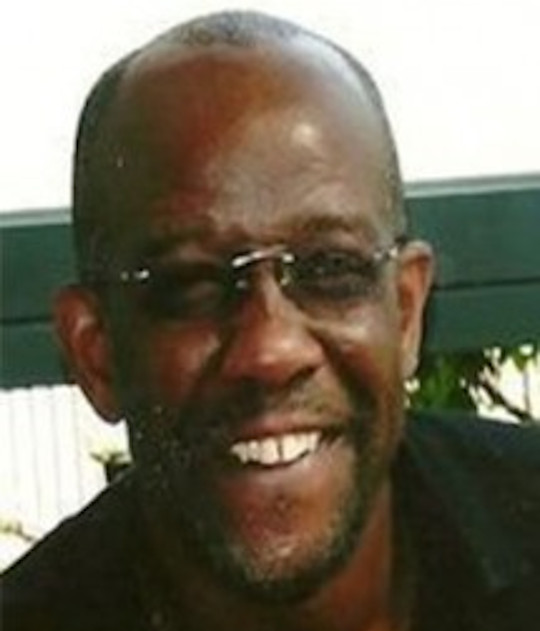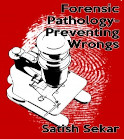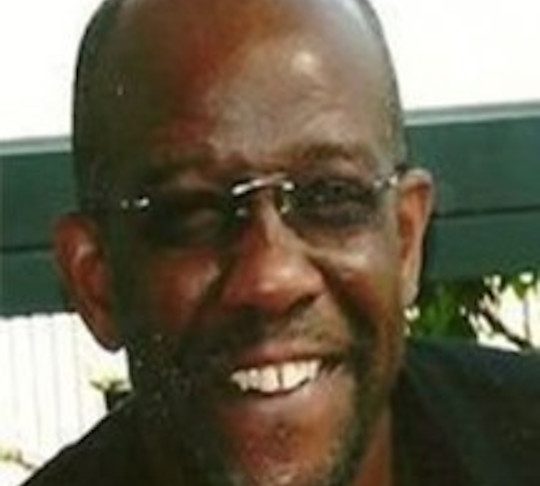
A Terrible Missed Opportunity
April 20, 2022(Archive) by Satish Sekar © Satish Sekar March 4th 2007
This article was originally published 15 years ago. It is published again in 2022 as Heath has surfaced again, practicing as a forensic pathologist despite the findings against him.

The families of two Kent men protesting their innocence have just criticised the Criminal Cases Review Commission’s recent review of disgraced forensic pathologist Dr Michael Heath in those cases for missing important opportunities. They say that pathology-related issues that could have helped to prove the innocence of their family members have not been considered during the review or subsequently. They claim that this will cause further delays in proving their innocence, meaning that their relatives will spend over a decade each in prison for crimes they did not commit.
Dr Heath resigned from the Home Office’s Register of Forensic Pathologists after a finding against him by the tribunal of the Home Office Pathology Delivery Board last year.
“The Commission is considering the implications of the recent finding by the Home Office Advisory Board[1] against Dr Michael Heath,” said Boris Worral, then Head of Communications at the CCRC. “This involves looking at the small number of current cases under review by the Commission as well as revisiting a number of previous applications in which Dr. Heath features. A Commissioner David Jessel is co-ordinating the Commission’s response to this issue.”
Last October the CCRC confirmed that eight cases – three under review at the time, and five previous cases – would be looked at again ‘in the light of the Home Office decision on Heath.’
Dr Heath took years to achieve membership of the Royal College of Pathologists because he repeatedly failed his exams. His work has been criticised by pathologists, lawyers or judges in at least eight cases other than those of Kenneth Fraser and Steven Puaca – the two that featured in the tribunal. Inquest verdicts were overturned. Convictions were quashed and acquittals secured because courts could not have believed Heath’s evidence. Some of these cases occurred over a decade ago. Among them is that of Craig Kerwin. In 1997 Kerwin was acquitted of the March 1996 ‘murder’ of 73-year-old Jocelyn Strutt in Southborough, Kent – a ‘crime’ that two forensic pathologists and the trial judge insist did not occur. Forensic pathologists Nat Cary and Vesna Djurović strongly disputed Heath’s view that a blow had caused a myocardial infarct to rupture. Djurović’s opinion stated that “there was no pathological evidence whatsoever, to suggest that Mrs. Strutt suffered a ‘heavy’ blunt impact to the chest.” Dr Cary agreed with Djurović’s findings.
“The assumption that Dr Heath was assessed only on his actions in the Fraser and Puaca cases is untrue,” said Fiona Hickman the CCRC’s Corporate Affairs and Complaints Manager. “The CCRC is in a position to assess very many of Dr Heath’s cases, and it has done so on the very wide basis that his professional judgment has been called into question. It would be wrong, however to assume that every case in which Dr Heath had played any part – either as defence or prosecution expert – was for that reason unsafe.”
The CCRC was asked to clarify specifically whether the facts of these eight proven cases, which were named, had been considered when deciding which of the fifty-four cases at the CCRC that Heath was involved in should be looked at again. “We cannot make it any plainer that we reviewed all the Heath cases on the grounds that his expertise could not be relied on,” said Ms Hickman. “It would matter not if he had been found derelict in ten, twenty or a thousand cases. His expertise would still be equally unreliable. We are still at a loss to understand what point you are trying to make.”
Neil Sayers’ case was one of those that were rejected. In April 1999 Sayers was convicted with Graham Wallis of the May 1998 murder of his friend Russell Crookes. Wallis pleaded guilty, but blamed Sayers for the murder. “My son is innocent,” said Richard Sayers “but he has remained in prison for nine years maintaining his innocence throughout that time. The CCRC has said that they had special regard for cases where medical evidence was critical to the conviction. Neil’s case does not fit that criterion, but there are still issues that deserve to be investigated.”
Sayers’ mother Angela shared her husband’s concerns. “We strongly believe that more extensive investigation of the pathology-related issues could discredit Wallis’ claims,” says Mrs Sayers. “By not looking into all of those issues in my son’s case, the CCRC are causing innocent people like my Neil, to remain behind bars when thorough investigation of these issues could prove their innocence.”
Leading solicitor Steven Bird represents Mr Sayers now. “In my review of those cases where Dr Heath was the pathologist I have had special regard to those in which the medical evidence was critical to the conviction. Having revisited the Statement of Reasons in Mr Sayers’ case I have not found this to be the case. I further note that in his submissions to the CCRC he argues that there was no forensic evidence which linked him to the commission of the crime, in which case any challenge to the evidence of a forensic pathologist would seem to be misplaced,” wrote David Jessel in a letter to Mr Bird regarding the investigation of Heath as it applied to the case of Mr Sayers.
“If the complaints made by Neil Sayers’ parents are correct it seems that David Jessel may have been premature in his decision not to investigate Dr Heath’s involvement in Sayers’ case more fully by restricting himself to the CCRC’s own Statement of Reasons,” said Dr Michael Naughton, a lecturer at Bristol University who founded the Innocence Network UK and the first innocence project in the UK. “If the CCRC truly wanted to act in the interests of justice, a wider interrogation of other available scientific evidence would have been appropriate before reaching its conclusions.”
A previous application to the CCRC by solicitors who no longer act for Mr Sayers failed to highlight scientific issues that legal experts say are at the heart of Sayers’ case. “It has been explained to us by experts that the scientific issues in Neil Sayers’ case have not been investigated as they could and should have been,” said Trevor Vallens, Vice-Chair of Kent Against Injustice, a campaigning group that supports the families of prisoners protesting their innocence. “We therefore believe that Dr Heath’s conduct effectively prevented Neil from proving his innocence, as it prevented adequate use of other scientific techniques that may have provided vital evidence for him.”
KAI also supports Michael Stone who was convicted of the 1996 murders of Lyn and Megan Russell and the attempted murder of Josie Russell. Stone has always protested his innocence. His case arrived at the CCRC just as the Heath investigation was winding down. It was wrongly reported in some media that it would be one of the cases to be investigated further. Despite taking almost a decade to exhaust domestic remedy the CCRC’s investigation of Stone’s case has yet to begin, even though there is a precedent to do so. The investigation of the case of Gary Mills and Tony Poole began out of date order of it arriving at the CCRC because it had taken seven-and-a-half years to exhaust the appeals process, causing them to miss a reference to the CCRC from the Home Office as well. Their convictions were quashed in June 2003.
“I think it is disgraceful that Heath’s involvement in Mick’s case still has not been investigated by the CCRC. They will have to investigate Heath’s involvement in his case anyway. By not doing so earlier, they will have to do so later, causing further delays in obtaining justice for Mick,” said Stone’s sister, Barbara.
“The case against Mick has collapsed, but even if the CCRC had considered his case in their review of Heath it would have been rejected because Heath’s evidence against him was not critical. However, if it can be relied on that would support our belief that his DNA should have been found on the bootlace if he was guilty. Neither Mick’s DNA nor fingerprints have been found on any items from the crime scene. The CCRC’s refusal to investigate Heath’s involvement in Mick’s case so far is delaying us proving his innocence. That is scandalous.”
The Attorney General declined to investigate all of Heath’s cases as he thought the CCRC’s investigation would suffice. Only cases where medical evidence was critical to the conviction were given special regard in determining which cases should be looked into further.
“If the complaints made by the families of Michael Stone and Neil Sayers are justified, then David Jessel’s review appears to be extremely limited,” said Dr Naughton. “There is other evidence in both cases, but there are also good reasons to question the truthfulness of that evidence as well. This may have happened in other cases too and the CCRC could be responsible for leaving potentially innocent people in prison.”
“We had hoped that the CCRC’s review of Dr Heath’s conduct would help to prove the innocence of Michael and Neil,” said Mr Vallens. “There were two previous cases in Kent where courts rejected Heath’s evidence, yet the CCRC will not confirm if they considered the impact of those cases on Neil and Michael’s cases. Why not? There are others as well.”
Two of the eight proven cases were ones that had been referred back for appeal by the CCRC. In his book Trial and Error, Jessel strongly criticised the standard of Heath’s work in Sheila Bowler’s case. Mrs Bowler was subsequently acquitted after a retrial.
“All of Heath’s cases should be investigated thoroughly,” said Victor Boreman. “I cannot understand why the CCRC will not confirm if their investigation of Heath looked at the facts of my case and how similar they might have been to other cases when considering which cases should be looked into further.”
The murder convictions of Mr Boreman, Malcolm Byrne and Michael Byrne were quashed as Heath’s tribunal opened due to the poor quality of Heath’s work. It had been referred back for appeal by the CCRC for that reason.
“If true, it is alarming that eight proven cases which go beyond professional disagreement were not looked into by the CCRC,” said Dr Naughton. “It is at least possible that of the cases that the CCRC, allegedly, decided did not require further examination at least one of them has similar facts to one or more of the eight proven cases, rather than to Fraser or Puaca. As such, it is possible that potentially innocent people are languishing in prison because the CCRC’s investigation did not consider the impact of those cases. If they have considered them specifically, they should simply say so. We had to set up the Innocence Network UK because the CCRC does not investigate the possibility of innocence properly. The way they are claimed to have handled the Heath investigation shows why Innocence Projects are necessary. No stone should be left unturned in the pursuit of justice.”
[1] The Tribunal was organised by the Pathology Delivery Board not Advisory Board.


